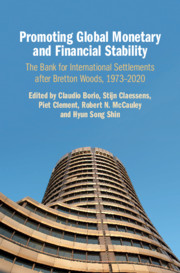 Promoting Global Monetary and Financial Stability
Promoting Global Monetary and Financial Stability Book contents
- Promoting Global Monetary and Financial Stability
- Studies in Macroeconomic History
- Promoting Global Monetary and Financial Stability
- Copyright page
- Contents
- Graphs and Tables
- Contributors
- Foreword
- Acknowledgements
- Abbreviations
- Introduction
- 1 The BIS and the European Monetary Experiment
- 2 The Governance of the Bank for International Settlements, 1973–2020
- The BIS in Pictures, 1973–2020
- 3 A Theory of Everything
- 4 Tower of Contrarian Thinking
- 5 Exchange Rates, Capital Flows and the Financial Cycle
- 6 The Bank for International Settlements
- Book part
- Note on Sources
- Bibliography
- Index
- Other Books in the Series (Continued from p. ii)
6 - The Bank for International Settlements
If It Didn’t Exist, It Would Have to Be Invented (An Insider’s View)
Published online by Cambridge University Press: 10 April 2020
- Promoting Global Monetary and Financial Stability
- Studies in Macroeconomic History
- Promoting Global Monetary and Financial Stability
- Copyright page
- Contents
- Graphs and Tables
- Contributors
- Foreword
- Acknowledgements
- Abbreviations
- Introduction
- 1 The BIS and the European Monetary Experiment
- 2 The Governance of the Bank for International Settlements, 1973–2020
- The BIS in Pictures, 1973–2020
- 3 A Theory of Everything
- 4 Tower of Contrarian Thinking
- 5 Exchange Rates, Capital Flows and the Financial Cycle
- 6 The Bank for International Settlements
- Book part
- Note on Sources
- Bibliography
- Index
- Other Books in the Series (Continued from p. ii)
Summary
This chapter is a reflection or insider’s view provided by a former President of the Federal Reserve Bank of New York and long-standing member of the BIS Board of Directors, William Dudley. Based on his first-hand experience, and in reference to the crucial decade following the global financial crisis of 2007–9, his contribution reflects on the usefulness of the BIS as the global cooperative organisation of central banks. The BIS continues to play a crucial role as a forum for information exchange and discussions among central bankers and for informal networking. In addition, through its research, meetings and policy work it enables international consensus-building with a view to promoting global financial stability. The contribution also identifies some areas in which the BIS can and should further improve, in particular in terms of its transparency, diversity and inclusiveness. The efficient coordination of work and the ongoing cooperation between the BIS and the other key stakeholders in the international financial system, in particular the IMF and the World Bank, also figures high on the agenda.
Keywords
- Type
- Chapter
- Information
- Promoting Global Monetary and Financial StabilityThe Bank for International Settlements after Bretton Woods, 1973–2020, pp. 206 - 213Publisher: Cambridge University PressPrint publication year: 2020
